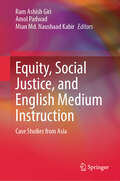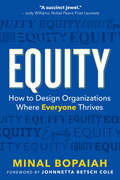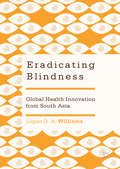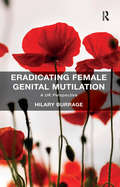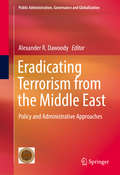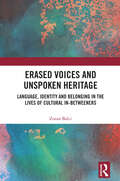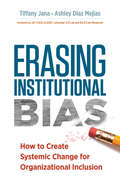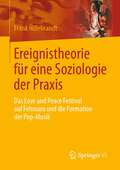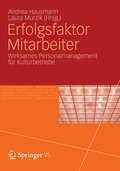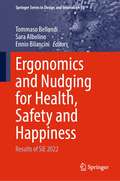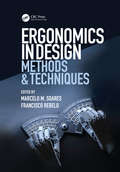- Table View
- List View
Equity, Social Justice, and English Medium Instruction: Case Studies from Asia
by Ram Ashish Giri Mian Md. Naushaad Kabir Amol PadwadThis book contributes to the existing body of knowledge on English Medium Instruction's (EMI) role in equity and social justice and adds to the ongoing conversation by providing the Asian perspective to it. It showcases scholarly works by scholars and researchers in the field and presents their diverse voices on EMI and social justice in a single volume. This book focuses on different aspects of the issue on EMI, equity, and social justice in different Asian contexts while providing a holistic picture of social justice in English language teaching in the region. It focuses on the current context-specific EMI practices situating them in their historical pretext, employs prevalent theoretical as well as methodological models and approaches to study such practices, considers curricular and pedagogical considerations adapted to address the multitude of needs of EMI, and examines controversies surrounding the conceptualization, plan/policy, and implementation strategies of EMI.
Equity: How to Design Organizations Where Everyone Thrives
by Minal BopaiahA fast and engaging read, Equity helps leaders create more inclusive organizations using human-centered design and behavior change principles.Even the most passionate advocates for diversity, equity, and inclusion have been known to treat equity as the middle child—the concept they skip over to get to the warm, fuzzy feelings of inclusion. But Minal Bopaiah shows throughout this book that equity is critical if organizations really want to leverage differences for greater impact.Equity allows leaders to create organizations where employees can contribute their unique strengths and collaborate better with peers. Bopaiah explains how leaders can effectively raise awareness of systemic bias and craft new policies that lead to better outcomes and lasting behavioral changes. This book is rich in real-world examples, such as managing partners at a consulting firm who learn to retell their personal stories of success by crediting their systemic advantages and news managers at NPR who redesign their processes to support greater diversity among news sources. This slender book expands DEI past human resources initiatives and shows how leaders can embed equity into core business functions like marketing and communications. Filled with humor, heart, and pragmatism, Equity is a guidebook for change, answering the question of how that so many leaders are asking today.
Eradicating Blindness: Global Health Innovation From South Asia
by Logan D. WilliamsThis book describes community ophthalmology professionals in South Asia who demonstrate social entrepreneurship in global health to help the rural poor. Their innovations contested economic and scientific norms, and spread from India and Nepal outwards to other countries in Africa and Asia, as well as the United States, Australia, and Finland. This feminist postcolonial global ethnography illustrates how these innovations have resulted in dual socio-technical systems to solve the problem of avoidable blindness. Policymakers and activists might use this example of how to avoid Schumacher's critique of low labor, large scale and implement Gandhi's philosophy of good for all.
Eradicating Female Genital Mutilation: A UK Perspective
by Hilary BurrageThis ground-breaking handbook details the present situation with regard to female genital mutilation (FGM) in Britain, referring also to other Western nations where FGM occurs. It scrutinises current pathways to eradicating this dangerous, sometimes lethal, form of child abuse and gender-related violence. The cultural and belief systems giving rise to FGM are complex. Further, FGM is an intensely intimate matter often imposed on young and vulnerable children. Approaches to its eradication therefore demand considerable human insight and a competent grasp of inter-/cross-agency working. It is also vital that everyone concerned - whether in caring and parental, safeguarding or other roles - understands fully that, regardless of custom or belief, FGM is a serious crime. The vulnerabilities and need for protection of victims and potential victims are paramount, but these pressing priorities do not lessen the requirement that all aspects of FGM be dealt with straightforwardly in accordance with the law. This book makes the case urgently for developing a shared, coherent model - a multi-disciplinary paradigm articulated at the highest level - as the basis to achieve the eradication of FGM. The text will be required reading for health, legal, educational and social services professionals, as well as researchers, policy-makers, school governors, journalists and other concerned citizens.
Eradicating Terrorism from the Middle East
by Alexander R. DawoodyThis book analyzes the contributing factors responsible for the emergence of terrorism in the Middle East with specific case studies based on empirical data that anchors the analyses in real life observation and posits unbiased, bipartisan solutions. Terrorists are targeting civilian populations around the world and increasing pressure on civil liberties, public policy and democratic institutions. With the defeat of one terrorist organization several more take its place. This book includes case studies in public administration initiatives from various Middle Eastern countries, and investigates regulation, public information, monetary and financial responsibilities, security, and civic infrastructure as possible solutions to this ever-worsening problem. With terrorism emerging as a major global policy issue this book speaks to global security and public policy and administrative issues in the Middle East, and will be of interest to researchers in terrorism and security in the Middle East, public administration, international relations, political economy, and to government officials, security analysts and investors.
Erased Voices and Unspoken Heritage: Language, Identity and Belonging in the Lives of Cultural In-betweeners
by Zozan BalciIn a world where cultural identity is often defined by national borders, this book follows the compelling journeys of young adults caught between preserving the culture and language of their migrant parents and navigating societal pressures to fit into the country in which they were born. Through intimate “walk-and-talk” interviews, the book gives voice to young adults who reflect on their experiences growing up with multiple languages and cultures. These personal stories offer a rich exploration of language, place, and belonging that resonates with anyone familiar with the struggle to reconcile different worlds.The book provides an insight into their multifaceted lives, inviting readers into the intimate spaces where personal identity meets societal expectation. The book challenges conventional paradigms of cultural conformity and examines how these young adults define themselves beyond simplistic labels. Erased Voices and Unspoken Heritage offers fresh perspectives on why some second-generation migrants embrace, reject, or negotiate their heritage languages. It also critiques the harmful consequences of “passing” within homogenous constructs and highlights the broader implications for diversity, hybridity, and multilingualism. This thought-provoking book will appeal to anyone interested in the complexities of identity, race, and language in multicultural societies.
Erasing Institutional Bias: How to Create Systemic Change for Organizational Inclusion
by Tiffany Jana Ashley Diaz MejiasAll humans have bias, and as a result, so do the institutions we build. Internationally sought after diversity consultant Tiffany Jana offers concrete ways for anyone to work against institutional bias no matter what their position is in an organization. Building upon the revelatory power of her book Overcoming Bias, which addressed managing individual and interpersonal bias, Erasing Institutional Bias scales up the framework to impact systemic change in organizations. Jana and coauthor Ashley Diaz Mejias bring together in-depth research on how biases become embedded into workplace cultures with practical and engaging tools that will mobilize readers toward action. They confront specific topics such as racism, sexism, hiring and advancement bias and retribution bias, meaning when organizations develop a culture of aggression, and offer solutions for identifying and controlling them. This book urges readers to ask questions such as, "Are we attempting to create systems in which all people can thrive? What kind of world and what kind of workplaces are we cultivating?" These questions, the authors say, must first be answered by ourselves, recognizing our own role in perpetuating harmful biases that come to define institutions. In a world divided, Erasing Institutional Bias is designed to raise awareness about imbalances and help us hold ourselves accountable for creating a world that works for everyone. Each of us can evaluate our own current role in perpetuating systemic bias and define our new role in breaking it down. Jana and Mejias inspire and equip us so that we can all affect organizational change, together.
Ereignistheorie für eine Soziologie der Praxis: Das Love and Peace Festival auf Fehmarn und die Formation der Pop-Musik
by Frank HillebrandtDie praxissoziologische Theorieanlage, die in diesem Buch aus dem Ereignisbegriff entwickelt wird, zwingt zu der Frage, wie sich die Praktiken nicht nur zu Praxisformen verketten, sondern wie diese Praktiken auch Praxisformationen entstehen lassen, die sich dauerhaft als Intensitätszonen der Gesellschaft ereignen. Genau dieses Problem steht im Mittelpunkt der hier verfolgten Überlegungen und wird über eine Analyse der Pop-Musik als Formation der Praxis entfaltet. Als beispielhafte Fallstudie wählt der Autor das Love and Peace Festival auf Fehmarn aus dem Jahr 1970. Dadurch lässt das Buch eine Zeit der Pop-Musik wieder lebendig werden, die sehr viel mehr mit unserer Gegenwart zu tun hat, als es auf dem ersten Blick scheint.
Erfahren – Widerfahren – Verfahren: Körper und Leib als analytische und epistemologische Kategorien Sozialer Arbeit (Zürcher Begegnungen)
by Clarissa Schär Julia Ganterer Martin GrosseIn dem Band werden „Körper“ und „Leib“ als Analyse- und Erkenntniskonzepte sowohl auf das Handlungsfeld als auch das Theorie- und Forschungsfeld Soziale Arbeit bezogen. Zentraler Ausgangspunkt ist dabei, dass das Erfahren und das Widerfahren sozialpädagogischer Verfahren(-sweisen) an körperleibliches Wahrnehmen und körperleibliche Interaktionen aller beteiligten Akteur*innen rückgebunden sind. Es werden Zugänge präsentiert, die in unterschiedlicher Weise Aspekte von Körper und Leib in der Sozialen Arbeit als Praxis und Wissenschaft thematisieren und somit einen hybriden Diskussionsraum eröffnen.
Erfolgreich Denken und Arbeiten in Netzwerken: Networking als Kulturtechnik
by Klaus-Dieter MüllerDas Zusammenleben der Menschen hat sich verändert und erfordert entsprechende Verhaltensweisen. Wo Gewissheiten verloren gehen, muss gleichwohl etwas existieren, was die Gemeinschaft zusammen hält. Dieses verbindende Element ist das Netz in all seinen personalen (haptischen) und auch digitalen Formen bis hin zum Crowd Funding. Netze sollen einen Nutzen haben für die Karriere, das Einkommen und für den sozialen Status. Nutzen, Zweck und Wert sind darum drei wesentliche Elemente der Netzwerkarbeit. Klaus-Dieter Müller legt dabei besonderen Wert auf die menschlichen Aspekte von Networking. Dahinter steht ein von ihm vertretenes Menschenbild, nämlich das Selbst als Dreh- und Angelpunkt seines Wirkens in der Welt. Die Identität des Individuums wird zu einem Problem der gesellschaftlichen Moderne. Es kommt nun darauf an, den Zusammenhang zwischen Selbst und Netz zu erkennen. Der Autor liefert viele Tipps, Hinweise und Erfahrungsberichte dazu, wie der Zweck und Nutzen eines Netzwerks mit den eigenen Befindlichkeiten und der Stellung in der Welt in Übereinstimmung zu bringen sind. Netzwerkarbeit ist eine Kulturtechnik, ähnlich wie Lesen und Schreiben, sie kann Gegenstand von Unterricht, Training und Beratung sein.
Erfolgreich Führen in Transformationsprozessen: Kompetenzen einer entwicklungsbereiten Führungskraft (essentials)
by Heiko MiedlichTransformationsprozesse stellen uns vor immer neue Herausforderungen. Der Umgang mit Komplexität im Kontext „Führungskraft“ ist für Organisationen essentiell überlebenswichtig. All die notwendigen (Ver‑)Änderungen basieren auf unserer bewussten Entscheidung, Dinge künftig anders zu machen als bisher. Das gelingt nur, wenn wir lernen. Dabei stehen unsere Werte zentral im Mittelpunkt und beeinflussen bewusst und unbewusst unsere Entscheidungen. Es gibt kein Rezept, wie das gelingt. Aus seinen Erfahrungen weiß der Autor jedoch, welche notwendigen Voraussetzungen erfüllt sein müssen, dass überhaupt die Chance besteht, Teams erfolgreich in Transformationsprozessen zu führen.Den kostenlosen Zugang zum Online-Kurs finden Sie direkt im Buch.
Erfolgreich abnehmen und schlank bleiben: Nachhaltige Gewichtsreduktion wissenschaftlich belegt
by Uwe KnopDieses Sachbuch möchte allen eine ehrliche Unterstützung bieten, die ernsthaft abnehmen und ihr neues Wunschgewicht auch langfristig halten möchten. Denn: Es ist unbestritten, dass viele Frauen und Männer abnehmen wollen, und sie machen Diäten. So werden jedes Jahr aufs Neue viele Abnehmwillige mit falschen Versprechungen zur neuen„besten Diät“ hinters Licht geführt. Dieses Sachbuch geht erstmals einen anderen Weg: I DIET MY WAY - ist das neue Konzept für alle, die ihren individuellen Weg des Abnehmens maßgeschneidert bis zu ihrem persönlichen Wohlfühlgewicht gehen möchten – und anschließend dabei bleiben wollen. In diesem Buch finden Sie alles zum Thema "Kilos verlieren", was Sie wissen müssen, um langfristig abzunehmen und Ihr Wunschgewicht auch zu halten. Dabei basieren die Erkenntnisse und Empfehlungen vom Autor Uwe Knop auf den aktuellen Erkenntnissen und dem derzeitigen Konsens der WissenschaftLeicht verdaulich und unterhaltsam erfahren Sie in diesem Buch: Abnehmen ist möglich.Das Diätprinzip ist bei allen Diäten immer gleich.Das reduzierte Gewicht zu halten, ist die „hohe Kunst“. JoJo-Effekt & Co: Risiken, die Ihr Gewicht ins Schwanken bringenPraxistipps, wie Sie starten und dran bleiben Sie möchten erfolgreich abnehmen und dauerhaft schlank bleiben? Dann lesen Sie dieses Buch.
Erfolgreich sein als Führungskraft in der Arbeitswelt 4.0: Begeisterung wecken mit Zukunftskompetenzen und Coaching-Tools (essentials)
by Anke LüneburgIn der Arbeitswelt 4.0 werden andere Führungskompetenzen gebraucht als bisher: Organisationen werden verändert, Führungskräfte übernehmen neue Rollen, Mitarbeiter wollen anders geführt werden. Um als Führungskraft zukünftig erfolgreich zu sein, müssen Entscheider ihre Stärken, Potenziale und Werte kennen und nutzen. Erfolgsfaktoren für echte Führungspersönlichkeiten sind klare Kommunikation, Selbststeuerung und Menschenkenntnis. Anke Lüneburg zeigt in diesem essential, wie Selbstreflexions- und Kommunikationsfähigkeiten entwickelt und für eine erfolgreiche Führung eingesetzt werden können. In kurzen prägnanten Abschnitten werden die wichtigsten Zukunftskompetenzen und ihr Nutzen für unterschiedliche Führungspositionen vorgestellt und können anhand von Übungen u.a. aus dem Coaching umgesetzt werden.Die Autorin:Anke Lüneburg ist Betriebswirtin, zertifizierte Coachin, Mediatorin, Beraterin und Trainerin im Bereich Führung, Berufsstrategien und Potenzialentwicklung sowie Autorin. Sie bringt über 20 Jahre Führungserfahrung als Managerin, Unternehmerin und Ausbilderin mit. Anke Lüneburg ist nebenberuflich Lehrbeauftragte mit dem Schwerpunkt Führungskompetenzen.
Erfolgreich selbstständig: Wie gründe und führe ich eine psychologische Praxis?
by Werner GrossDieses Buch ist ein Leitfaden zur Selbstständigkeit in den verschiedenen Berufsfeldern der Psychologie. Von der generellen Eignung selbstständig in einer (freien) psychologischen Praxis tätig zu werden, über Finanzierungsmöglichkeiten, den Gründungsprozess der eigenen Praxis bis hin zu Detailfragen wie Honorargestaltung beantwortet der Autor die wichtigsten Fragen der Existenzgründung als Psychologe oder Psychologin. Bei vielen Studierenden an der Schwelle zum Beruf, aber auch bei angestellten Psychologen besteht ein großer Informationsbedarf, wenn es um Kalkulationen, Konzepte, Kapital und Klienten geht. Und selbst „alte Hasen“ können davon profitieren – und sei es nur, um zu prüfen, ob sie bei ihrer Selbstständigkeit auch an alles gedacht haben. Hilfreich sind dabei Links zu Video-Clips des Autors. Aus dem Inhalt: Was müssen angehende Psychotherapeuten oder Psychotherapeutinnen auf ihrem Weg in die Selbstständigkeit beachten? – Welche Chancen hat man in der Rechtspsychologie? – Welche Optionen bietet die freie Wirtschaft? – Kann man von den Honoraren als Coach, Mediator oder Supervisor leben? – Welche Vorstellungen und Orientierungen sind dringend erforderlich, und wie steht es um das liebe Geld? – Wo sind die Gefahren und Klippen der Selbstständigkeit? Der Autor: Werner Gross, niedergelassener Psychotherapeut, Coach und Unternehmensberater ist Experte des BDP für Existenzgründungsfragen und führt seit über 30 Jahren Seminare für Psychologen und Psychotherapeuten durch.
Erfolgreich selbständig
by Werner Gross Andreas Goshöfer-NeubertDieses erste "Service"-Fachbuch für Psychologen liefert einen Leitfaden für die Existenzgründung in den verschiedenen Berufsfeldern der Psychologie. Der Autor, niedergelassener Psychotherapeut und Experte für Existenzgründung, beantwortet alle wesentlichen Fragen: von der Eignung für das selbständige Arbeiten über Finanzierungsmöglichkeiten, den Gründungsprozess bis zu Detailfragen wie Honorargestaltung. Außerdem werden die verschiedenen Tätigkeitsfelder für Psychologen - diplomiert oder mit Bachelor/ Master-Abschluss - vorgestellt.
Erfolgreiche Kundenansprache nach Plan: Grundlagen zur Erstellung eines Kommunikationskonzeptes (essentials)
by Peter Michael BakIndiesem essential erläutert Peter MichaelBak, wie ein Kommunikationskonzept für ein Produkt, eine Marke, eineDienstleistung oder eine Veranstaltung geplant sowie entwickelt wird und dabeidie wesentlichen Erfolgskriterien berücksichtigt werden. WerbepsychologischeGrundlagen und Praxistipps am Ende der einzelnen Kapitel bieten darüber hinausnützliche Hilfestellung für die eigene Arbeit. Damit sind die Ausführungen füralle interessant, die im Studium, in der Ausbildung oder bereits in Agenturenoder in Unternehmen mit der Aufgabe betraut sind, eine erfolgreicheKommunikationsmaßnahme planen und umsetzen zu müssen. Ganz gleich, ob es um(neue) Produkte und Dienstleistungen, Events oder News geht, erst einesorgfältige Planung von geeigneten Maßnahmen macht den Erfolg möglich.
Erfolgreiches Forschen im Sportstudium: Von der Idee zur Präsentation der Ergebnisse
by Frank Hänsel Fabienne Ennigkeit Julia M. Kornmann Klaus BösQuantitative Forschungsmethoden sind das A und O für sportwissenschaftliche Studien und Projekte. Doch wie gestaltet man den Forschungsprozess erfolgreich? Dieses praxisnahe Lehrbuch begleitet dich Schritt für Schritt: Von der Formulierung präziser Hypothesen über die saubere Planung und Durchführung deiner Studie bis hin zur fundierten Auswertung und Interpretation deiner Daten. Anhand konkreter Beispiele aus verschiedenen Disziplinen der Sportwissenschaft lernst du, quantitative Methoden gewinnbringend einzusetzen und deine Ergebnisse überzeugend zu präsentieren. Das Lehrbuch wird durch zahlreiche digitale Zusatzmaterialien abgerundet, z. B. Übungsaufgaben für die einzelnen Kapitel und Datensätze zum Nachvollziehen der im Buch dargestellten Ergebnisse statistischer Analysen. Zudem können über 20 Videotutorials mithilfe der SN More Media App aufgerufen werden, die anschaulich die Nutzung der Statistiksoftware jamovi erklären. Die Autorinnen und Autoren blicken alle auf langjährige Lehrerfahrung im Bereich der quantitativen Forschungsmethoden zurück und greifen innerhalb des Buchs immer wieder typische Rückfragen von Sportstudierenden auf. Neben Studierenden finden daher auch Dozierende hilfreiche Anregungen zur erfolgreichen Vermittlung von Modulinhalten.
Erfolgreiches Führen von Mitarbeitern: Wie Organisationen ihre Mitarbeitenden langfristig motivieren und begeistern können (essentials)
by Hans H. HinterhuberDer vorliegende Band bietet einen einführenden Überblick in die grundlegenden Erfolgskriterien der Mitarbeiterführung und -motivation. Vom Grundgedanken, was Führung bedeutet, bis hin zur Darstellung nicht-delegierbarer Aufgaben wird die Frage nach den Voraussetzungen erfolgreicher Führung in Organisationen beantwortet. Denn besonders in unruhigen Zeiten bedeutet erfolgreiches Leadership nicht nur Management und Mehrwert für den Kunden, sondern auch die Gemeinschaft der Mitarbeiter stärken, sie in ihrem Bestreben motivieren und so langfristig Erfolge auf beiden Seiten sichern.
Erfolgsfaktor Mitarbeiter
by Andrea Hausmann Laura MurzikDie wichtigste Ressource im Kulturbetrieb sind die Mitarbeiter. Künstler, Wissenschaftler, technisches Personal, Servicemitarbeiter, Verwaltungspersonal - sie alle sind immanenter Teil des Gesamtbetriebs und haben ihren Anteil daran, dass in deutschen Kulturbetrieben tagtäglich Höchstleistungen vollbracht werden. Dennoch ist das Personalmanagement für Kulturbetriebe ein vergleichsweise vernachlässigtes Thema in Forschung und Praxis. Der vorliegende Band soll eine verstärkte Auseinandersetzung mit dem Thema Personalmanagement in Kunst und Kultur anregen. Behandelt werden neben aktuellen Trends und Praktiken zentrale Fragestellungen der Beschaffung, Gewinnung, Führung und Entwicklung von Mitarbeitern.
Erfolgsfaktor Socializing: Knigge für optimales Auftreten und Networken
by Lioba Werth Christopher ThumSocializing ist so bedeutsam geworden wie nie zuvor. Menschlich miteinander „zu können“, ist wichtiger denn je, da der Wettbewerb immer stärker und die Nischen immer kleiner werden. Trotz des Wunsches, es möge „leicht und locker“ sein, gilt es, Eindruck zu machen, sich zu präsentieren und Geschäfte abzuschließen. Worauf kommt es nun wirklich an? Was vom alten Knigge, den bisherigen Umgangsformen und Erfolgsfaktoren gilt noch? Wie bespielt man die moderne Berufswelt im Sinne von Socializing und Networking? In diesem informativen und unterhaltsamen Ratgeber von der Psychologie-Professorin Lioba Werth und dem Gastronomiefachmann Christopher Thum wird Ihnen gezeigt, wie Sie berufliches Socializing sowohl klassisch, modern und smart verstehen und bespielen können. Smalltalk, Networking und Etikette werden nicht als Selbstzweck, sondern als eine Art Methode dargestellt, mit der Sie in vielen unausgesprochenen Botschaften signalisieren können, wie Sie auch außerhalb der Büroumgebung mit anderen Menschen umgehen.
Erfolgsfaktoren von Plattform-Geschäftsmodellen: Exemplarische Analyse des Geschäftsmodells der Livestreaming-Plattform Twitch (essentials)
by Britta Schammer Claudia Hess Mario BoßlauDieses essential betrachtet die Erfolgsfaktoren von Plattform-Geschäftsmodellen am Beispiel der international erfolgreichen Livestreaming-Plattform Twitch. Die Funktionsweise des Geschäftsmodells wird dabei mit Hilfe einer Adaption des Business Model Canvas für zweiseitige Plattformen untersucht. Das Vorgehen für die Analyse lässt sich im Sinne eines Werkzeugkastens auf andere Unternehmen übertragen. Das Verständnis für die im Buch beschriebenen Erfolgsfaktoren von Twitch kann eigene Geschäftsmodelle inspirieren.
Erfolgsstrategie Shopper-Marketing: Digitale Touchpoints und die Macht des Verkaufs
by Peter Dräger Lars RoischDieses Buch zeigt, wie die Kundenansprache über analoge und digitale Kanäle zielgerichtet und effektiv gelingt – an allen entscheidenden Touchpoints entlang der gesamten Customer Journey.Der Kaufprozess wird durch die Digitalisierung immer dynamischer und eröffnet eine Vielzahl neuer Möglichkeiten, Zielgruppen erfolgreich anzusprechen und zu binden. Die Autoren bieten praxisnahe Strategien für ein kundenzentriertes Shopper-Marketing, das sowohl die Anforderungen des stationären Handels als auch des E-Commerce berücksichtigt. Durch die nahtlose Verzahnung von stationärem Handel, E-Commerce und Social Commerce können Sie den Vertrieb nachhaltig stärken und den Umsatz steigern.Erfahren Sie, wie Sie durch gezielte Maßnahmen an allen entscheidenden Touchpoints Kaufimpulse aktivieren und das Kundenerlebnis verbessern. Zahlreiche Praxisbeispiele und Gastbeiträge der Shopper-Experten Jasmin Pampuch und Jens Krüger (Bonsai Research) runden das Werk ab und bieten wertvolle Einblicke in die neuesten Entwicklungen im Shopper-Marketing.
Ergonomics and Nudging for Health, Safety and Happiness: Results of SIE 2022 (Springer Series in Design and Innovation #28)
by Sara Albolino Ennio Bilancini Tommaso BellandiThis book presents the best, peer-reviewed contributions from the XII Congress of the Italian Society of Ergonomics and Human Factors (SIE), held in Lucca, Italy, on May 2-4, 2022. By highlighting the latest theories and models, as well as cutting-edge technologies and applications, and by combining findings from a range of disciplines including engineering, design, robotics, management, computer science, human biology and behavioral sciences, it provides researchers and practitioners alike with a comprehensive, timely guide on human factors and ergonomics in a variety of industrial sectors, such as health care, transportation, automotive and constructions. It also offers an excellent source of innovative ideas to stimulate future discussions and developments aimed at applying knowledge and techniques to optimize system performance, while at the same time promoting health, safety, and well-being of individuals anc communities. The proceedings includes papers from researchers and practitioners, scientists and physicians, institutional leaders, managers, and policy makers that contribute to constructing the Human Factors and Ergonomics approach across a variety of methodologies, domains, and productive sectors.
Ergonomics in Action: A Practical Guide for the Workplace
by Celine McKeownThis is a reprint of 978-0-901357-47-2 Ergonomics in action: a practical guide for the workplace is a no-nonsense introduction to the principles of workplace ergonomics. The book is very user-friendly and written in a clear, jargon-free style, and gives straightforward explanations and practical examples. Useful summaries at the end of each chapter highlight key points at a glance. The book focuses on ergonomics in the design process, job design and work organisation. It covers specific areas of ergonomic importance; including hand tools, computer use and manual handling, and also addresses the complex and sometimes controversial topic of upper limb disorders. Ergonomics in action also includes a chapter on the basics of anthropometry and offers several practical case studies to illustrate the human and commercial benefits of following good ergonomic principles. As a consultant ergonomist, Celine McKeown has extensive experience of applying the principles of ergonomics to a wide variety of sectors. She also trains, advises and writes on a broad range of ergonomics and health and safety issues.
Ergonomics in Design: Methods and Techniques (Human Factors and Ergonomics)
by Francisco Rebelo Marcelo M. SoaresCurrently people deal with various entities (such as hardware, software, buildings, spaces, communities and other people), to meet specific goals while going about their everyday activities in work and leisure environments. These entities have become more and more complex and incorporate functions that hitherto had never been allocated such as automation, use in virtual environments, connectivity, personalization, mobility and friendliness. This book contributes to the analysis of human-system interactions from the perspective of ergonomics, regardless of how simple or complex they are, while incorporating the needs of users and workers in a healthy safe, efficient and enjoyable manner. This book provides a comprehensive review of the state of the art of current ergonomic in design methods and techniques that are being applied to products, machinery, equipment, workstations and systems while taking new technologies and their applications into consideration. Ergonomics in Design: Methods and Techniques is organized into four sections and 30 chapters covering topics such as conceptual aspects of ergonomics in design, the knowledge of human characteristics applied to design, and the methodological aspects of design. Examples are shown in several areas of design including, but not limited to, consumer products, games, transport, education, architecture, fashion, sustainability, biomechanics, intelligent systems, virtual reality, and neurodesign. This book will: Introduces the newest developments in social-cultural approaches Shows different ergonomics in design methodological approaches Divulges the ways that ergonomics can contribute to a successful design Applies different subjects to support the design including –ergonomics, engineering, architecture, urbanism, neuro, and product designs. Presents recent technologies in ergonomic design, as applied to product design. With the contributions from a team of 75 researchers from 11 countries, the book covers the state-of-the-art of ergonomics in a way to produce better design.
